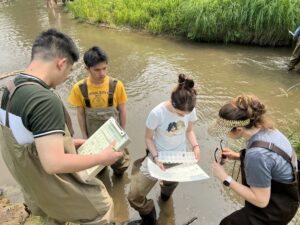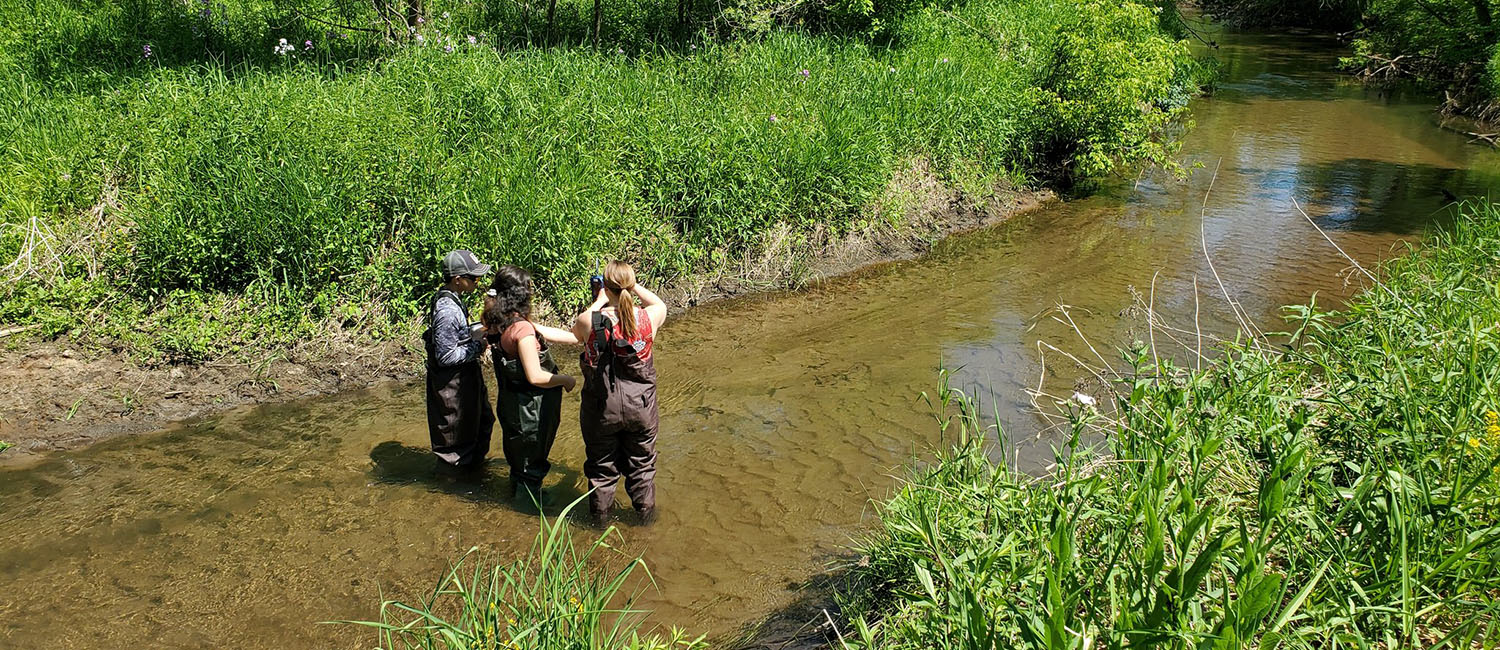Western Wisconsin is becoming a hub for preparing for careers in water industries, thanks in part to two cross-campus collaborations — a high school summer camp and an advanced field course for upper-level college students — involving UW-Eau Claire, UW Oshkosh, UW-River Falls and UW-Stout.
Faculty from the four campuses embarked on this growing partnership — funded by the Freshwater Collaborative of Wisconsin — three years ago when they piloted a high school summer camp. In its third summer in 2023, faculty worked with the Department of Public Instruction to promote the opportunity to students throughout the state of Wisconsin. As a result, the camp grew from 14 students from the Eau Claire area the first year to 23 students from nine high schools across Wisconsin, including seven students from the Milwaukee and Madison areas.

Camp participants learn about wetlands, fish, invasive species, Great Lakes beaches and contamination, and academic programs and careers focused on water science. Each day is spent in a different location, where they are taught by faculty from the four universities. The idea is to help high school students experience what it’s like to work in water science and to share what the UW schools have to offer in terms of hands-on coursework and internships that will prepare them to enter Wisconsin’s workforce — where their skills are critically needed.
“It’s good for students to have exposure to a variety of instructors from different campuses,” says Sarah Vitale, associate professor at UW-Eau Claire and the lead faculty member for the summer camp project. “They can learn they can get a really good job in this field with a bachelor’s degree, or if they go in this direction a master’s degree is recommended. Getting this kind of advice early helps them make decisions.”
The program has evolved to give students more applicable experience and an opportunity to meet and work alongside undergraduate students who are part of other Freshwater Collaborative-projects. For example, while at UW-Stout last summer, students worked in the field with research students funded by the Red Cedar Basin Monitoring Project.
Many of the same faculty are involved in the advanced fieldwork course for undergraduates.
“The high school course showcases the excellent curriculum and research opportunities available to students should they choose to attend a UW school in western Wisconsin while the undergraduate course diversifies student experiences,” says Nicole Hayes, assistant professor of biology at UW-Stout. “UW-Stout students gain valuable insights from working with professors from UW-Eau Claire, UW Oshkosh and UW-River Falls.”
The two-week advanced course immerses students in wide variety of applicable fieldwork to prepare them for different kinds of jobs. For example, they did a remote sensing analysis on Lake Menomin and then used what they learned to analyze a body of water near their hometown or where they vacation in the summer. They also learned about wetlands and how they are integrated with groundwater, storm water, soils, and surface waters.
Abbigale Coffin, an environmental biology and ecology major at UW-Eau Claire, took the course in 2022 and was a teaching assistant for it in 2023. The course opened her eyes to how interconnected ground and surface waters are, and she gained the confidence and knowledge to perform tests and handle equipment independently.
“The amount of hands-on experience really prepares you for working and collecting data in the field,” Coffin says. “All the knowledge I gained from this class at least doubled the list of skills on my resume and allowed me to discover my passion for protecting our state’s ground and surface water.”
The Freshwater Collaborative recently granted new funds to continue years four and five of the high school camp and years three and four of the advanced fieldwork summer course for undergraduates. The group will continue to enhance both courses, tapping into the strengths of each university and refining the curriculum to ensure it has direct application to the workforce. The advanced course is also intended to be part of future certificate programs the Freshwater Collaborative plans to roll out.
“It’s been exciting to see this cross-campus collaboration grow and connect with other projects we are funding,” says Marissa Jablonski, executive director for the Freshwater Collaborative. “It is a great example of how we are creating a pipeline to jobs by implementing programs that recruit young people to UW schools and then provide them with hands-on experiences that train them for the water workforce.”

